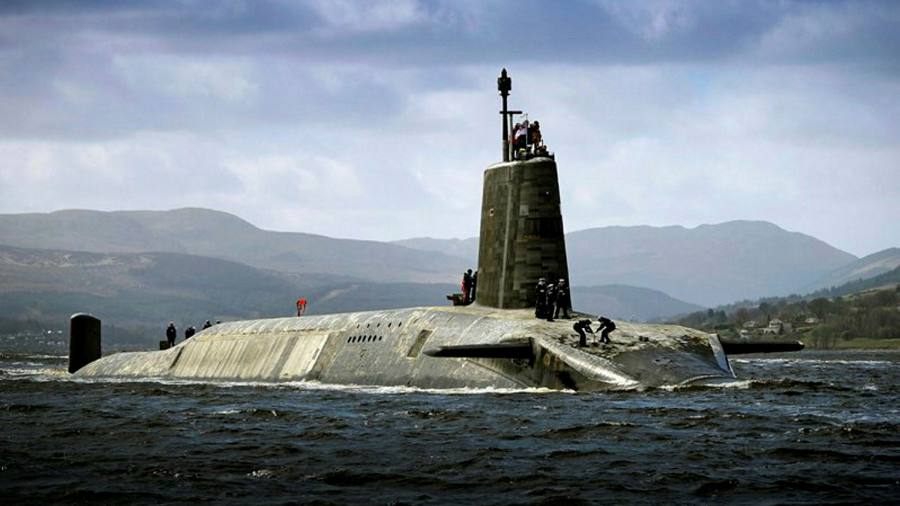[ad_1]
The writer is a senior research fellow at the Royal United Services InstituteÂ
The UK’s decision to raise substantially the self-imposed cap on its nuclear warhead stockpile to 260 warheads is a striking reversal of a two-decade push towards nuclear disarmament. An equally important part of the government’s integrated defence and foreign policy review is that it will no longer make public the number of Trident missiles and nuclear warheads deployed on its submarines.
Taken together with the rest of the review, which refers to greater global competition and developments in technology and nuclear doctrine, the country seems to be descending from the diplomatic high road and instead sending a message of deterrence.
The effect of these changes on the military balance with Russia, China and other potential adversaries is hard to calculate. The UK government explains only in general terms why its policy is changing. But its references to global competition suggest that it could be looking beyond Russia, the traditional driver of UK deterrence requirements. China, while not mentioned in the same breath, is expanding and diversifying its own nuclear arsenal.
The government also cites “doctrinal†threats — insider language probably best understood as code for Russia’s apparent interest in limited nuclear war — as demanding a response in kind. The review’s references to changes in technology may also imply concerns about improvements in the kinds of ballistic defences that UK weapons might have to penetrate. Still, changes in the strategic military balance may not be the only driver for the higher stockpile cap. There could be practical issues, such as the way nuclear warheads are maintained and upgraded, that make increasing the cap useful for entirely different reasons.
If the benefits of bolstered deterrence are up for debate, one immediate cost of lifting the stockpile cap is clear: the hit to the UK’s reputation in multilateral nuclear diplomacy. At home, opposition leader Sir Keir Starmer has criticised the higher nuclear stockpile cap as it is not explained “when, why or for what strategic purposeâ€. The international reaction may be even stronger.
In multilateral forums, such as review conferences for the nuclear non-proliferation treaty, the UK often presents itself as a leader on disarmament among nuclear-armed states. Both the previous target of 180 warheads, and declarations about the number of deployed weapons, have been a regular part of the UK’s diplomatic catechism. Britain has worked for more than a decade on the science and technology required to verify future nuclear arms control agreements, partnering with disarmament-leaning non-nuclear states like Norway.
It is possible the government calculates that its policy change will prove little more than a messaging problem. Non-proliferation treaty members might also be angry, but there is little they will do in practice. Nor will any country go nuclear simply because of the UK’s increased target. Maybe so, but the country should not be too confident this is as far as any damage will go. The attitude it shows to non-nuclear-armed states in the non-proliferation treaty clashes with the emphasis that the defence review places on multilateralism. If multilateral diplomacy and sticking to the spirit of international commitments is key to the battle against climate change, why not for keeping the nuclear peace?
The policy shift is likely to make life harder for non-nuclear countries that the UK has encouraged to spread the gospel of incremental disarmament (versus more radical demands posed by the new nuclear ban treaty, which aims to make nuclear weapons illegal). The shift may also make British partners in verification research suspicious that their efforts have been little more than a fig leaf for a state uninterested in seriously pursuing disarmament.
The UK is not responsible for the world’s descent into an era of greater nuclear competition; arguably, it was down to great power rivalry and Russian fear. Nor is the country primarily responsible for frustrations of non-nuclear states that disarmament has not gone faster. But, in the event that global arms control does progress and the UK is drawn in, its new warhead ceiling could approximate to the number that the UK might negotiate down from. So its policy change should be kept in perspective and all hope should not be lost.
Still, the defence review talks of a shift away from simply preserving the rules and institutions of the post-cold war status quo and towards shaping a new global order. Given that, it is reasonable to worry that the UK may be leaving behind the vision of a gradual lifting of the nuclear shadow.
[ad_2]
Source link





